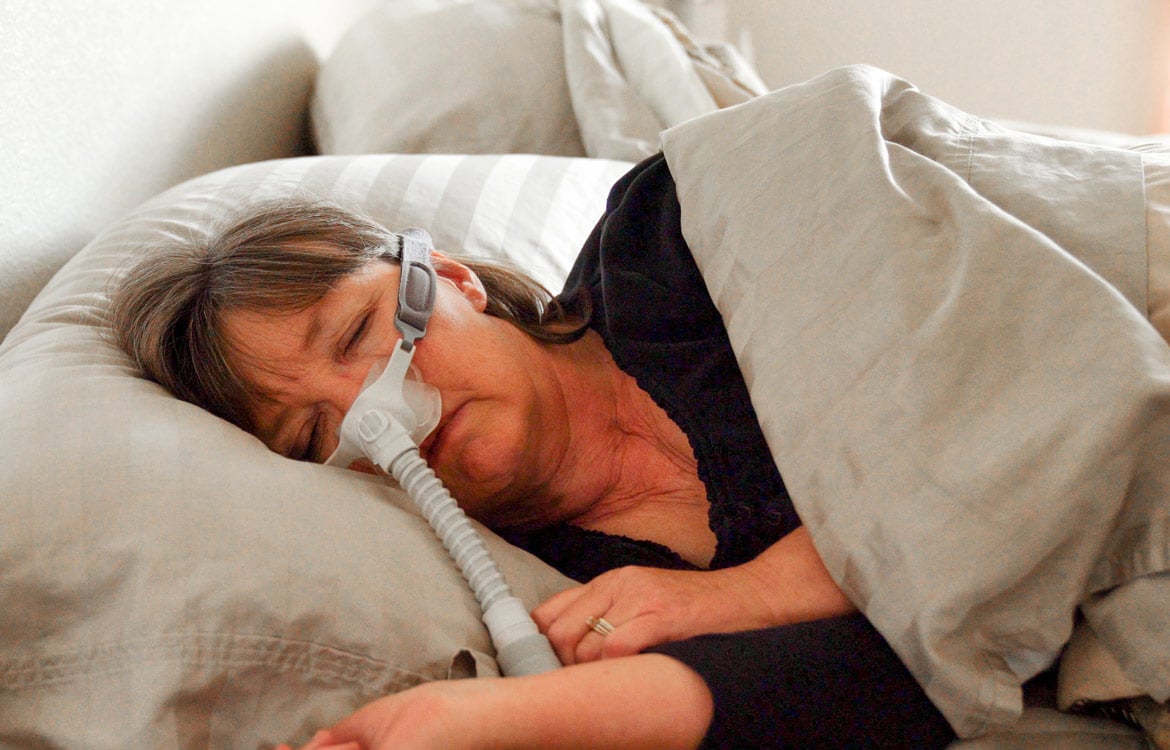Sleep Apnea and Insomnia: A Life-Threatening Combination

Do ever wake up out of breath or gasping? Are you unexplainably exhausted during the day? Does your spouse complain that you snore loudly? If you answered “yes” to any of these questions, you might be one of the 22 million Americans with sleep apnea, a serious sleep disorder that involves repeated, temporary lapses in breathing that occur throughout the night. Breathing disruptions often last at least 10 seconds, but in severe cases you can stop breathing in your sleep for as long as two minutes.
The condition is more common men; 34 percent of men and 17 percent of women live with sleep apnea. About 80 percent of cases are undiagnosed.
There are three basic types of sleep apnea:
- Obstructive – the most common type; it’s caused by a relaxation of the throat muscles.
- Central – a less common type that involves the brain not sending the proper signals to the muscles that control breathing.
- Complex – a less common type that combines both obstructive and central types of sleep apnea.
“Unfortunately, many cases of sleep apnea go untreated. Some people don’t realize their loud snoring or gasping is serious, so they don’t mention it to their doctor. However, other people are aware there’s a problem, but choose to ignore it because they don’t like the treatment options,” says Bernard Kaminetsky, MD, medical director, MDVIP. “However, if the condition isn’t treated, it can strain the respiratory and cardiovascular systems and lead to much bigger problems.”
Short term, sleep apnea can cause a long list of symptoms such as:
- loud snoring
- fatigue during the day
- waking up gasping for air
- restlessness
- dry mouth
- sore throat
- trouble concentrating
- forgetfulness
- irritability
- depression
- anxiety
- frequent nightly urination
- night sweats
- sexual dysfunction
- headaches
And long term, sleep apnea increases your risk of high blood pressure, heart problems, type 2 diabetes, obesity, metabolic syndrome and liver problems. When combined with insomnia, it raises the risk of cardiovascular disease and death from all causes, according to a study published in the European Respiratory Journal.
Sleep Apnea and Heart Problems
There are four primary physical connections between sleep apnea and heart health, according to the Sleep Foundation. These include:
- sleep interruption
- lower oxygen levels
- oxidative stress
- upper airway pressure
Breathing lapses interrupt sleep, so the respiratory and cardiovascular systems don’t get rest they need to recover from the previous day. Good quality sleep helps lower blood pressure and heart rate and stabilizes breathing.
It also lowers the oxygen level, triggering your nervous system to respond as if it’s in the throes of a stressful situation – hence waking up gasping for air. The activation of the nervous system also constricts blood vessels (raising blood pressure) and increases heart rate.
The lower oxygen levels also trigger oxidative stress – an imbalance between free radicals and antioxidants. Oxidative stress also is associated with systemic inflammation and cellular and molecular abnormalities, which can deteriorate heart function.
Sleep apnea, specifically obstructive sleep apnea, narrows the upper airways. This causes the pressure inside the chest cavity to flip to negative when inhaling. Gradually, negative chest pressure can damage the heart, and affect heart rhythm and blood flow to the heart.
The overall stress on the cardiovascular system raises the risk for coronary artery disease by 30 percent and heart failure by 140 percent. And if you have sleep apnea, you are between two and four times more likely to develop an abnormal heart rhythm, particularly if it’s untreated, according to the Sleep Foundation.
Insomnia and Heart Problems
Insomnia contributes to high blood pressure, obesity and type 2 diabetes – three significant risk factors for heart disease. Having three symptoms of insomnia:
- trouble falling asleep
- trouble staying asleep
- trouble with waking too early in the morning or trouble focusing during the day due to a lack of sleep — increased the chances of having a heart attack or stroke by 18 percent, according to a study published in Neurology.
“Sleep apnea is a treatable condition. Most physicians recommend some lifestyle changes, prescribe a CPAP machine and provide mouth and throat exercises,” says Kaminetsky. “Insomnia, however, can be trickier. Work with your doctor. They may be able to provide some lifestyle tips, suggest natural remedies, prescribe medications or refer you to a specialist.”
Preventing Sleep Apnea
Fortunately, there are steps you can take to lower your risk of developing sleep apnea, such as:
- Avoid tobacco: Smoking raises inflammation in the upper airways.
- Manage weight: Fat deposits around may obstruct breathing.
- Limit alcohol, sedatives and tranquilizers: Substances can relax throat muscles.
- Ease nasal congestion: Difficulties breathing through your nose – even if it’s related to allergies -- raise the risk for sleep apnea.
- Control conditions: Chronic health problems such as high blood pressure, type 2 diabetes, congestive heart failure, chronic pulmonary diseases and Parkinson’s disease raise the risk for developing obstructive sleep apnea.
If you’re concerned about sleep apnea, take this risk assessment >>
More importantly, work with your doctor to mitigate the risk of and complications from sleep apnea. Don’t have a doctor, consider working with MDVIP. MDVIP-affiliated physicians have the time and resources to help you focus on your health. Find a physician near you and begin your partnership in health »





